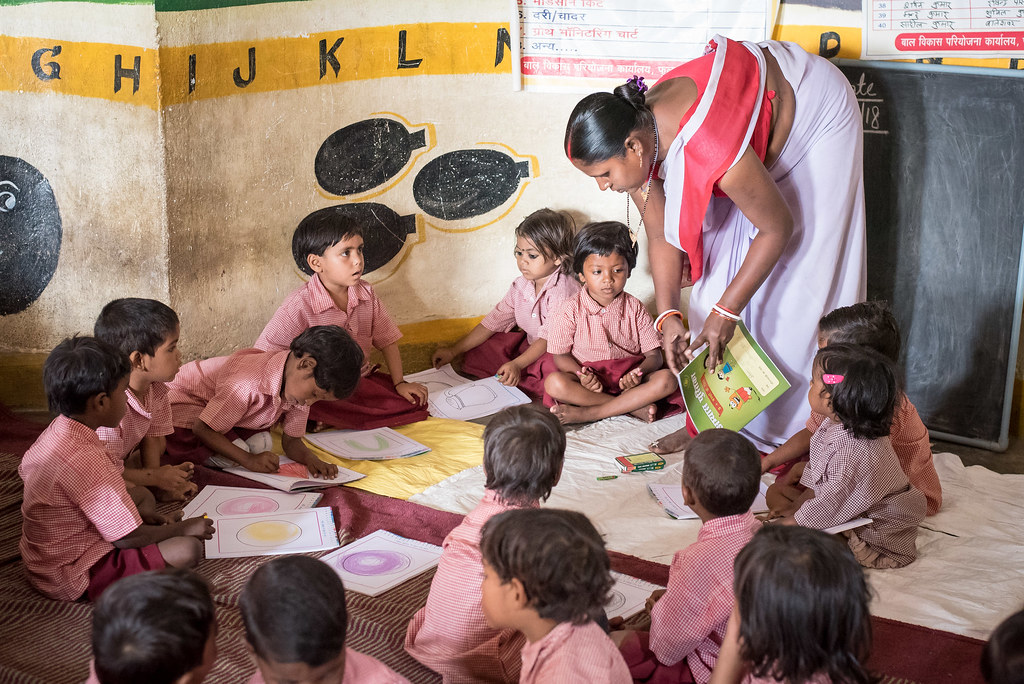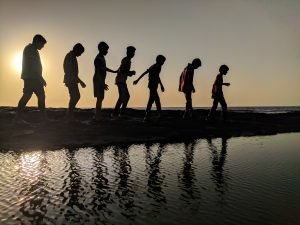“Studies show 30% of disabilities in India are preventable if caught early, and with the correct stimulation and simple play-based educational activities conducted for children under the age of 6 years, developmental delays can be prevented from developing into more severe disabilities.” – Shri Indevar Pandey, Secretary MoWCD, GoI. Anganwadi workers, often the first point of contact in the community for child care and development, are now at the forefront of this ambitious program. Their role has been significantly expanded to include the early identification and tracking of children with disabilities. This task is facilitated by the Poshan Tracker app, a digital tool that allows these workers to collect, monitor, and manage data on the health and development of children under their care.
The Anganwadi Protocol
The protocol outlines a comprehensive training program for Anganwadi workers. The training equips them with the knowledge and skills to identify signs of developmental delays and disabilities in children. Once identified, children are assessed for various developmental delays at the onset of potential disability. The assessment process is thorough and takes into consideration a range of developmental milestones. Following this, children who require additional support are referred to local health professionals, including Accredited Social Health Activists (ASHA) and Auxiliary Nurse Midwife (ANM). These referrals are an integral part of a larger network of support, ensuring that the child receives comprehensive care tailored to their specific needs.
“According to Census 2011, 2.2% of people are disabled in India, which is about 3 crore adjusted to the current population. This makes early intervention and identification crucial” – Shri Rajesh Aggarwal, Secretary (DEPwD)
The protocol emphasizes the importance of integrating children with disabilities into mainstream schools. This approach aligns with the broader goal of inclusive education, where children of all abilities learn together in the same environment. Integrating children with disabilities into regular schools not only provides them with better educational opportunities but also promotes social inclusion, reducing stigma and discrimination against disabilities.
By extending the resources and guidance to the families of these children, family-centred this initiative ensures that the child is supported not just at the Anganwadi centres but also at home.
Implementation
“Let us not allow our minds to limit what a child’s able heart is capable of” – Smt Smriti Irani, Union WCD Minister
The implementation of this protocol is a significant undertaking, requiring coordination between various government departments, including the Health Ministry and the Department of Empowerment of Persons with Disabilities. This inter-departmental collaboration underscores the government’s commitment to creating a cohesive and comprehensive support system for children with disabilities.
In line with the diverse needs of children with disabilities, Anganwadi centres are adopting a multi-sensory and toy-based intervention approach. This holistic approach is tailored to engage children with various disabilities effectively, enhancing their learning and developmental experiences. Multi-sensory learning, which involves using various senses in the learning process, can be particularly beneficial for children with disabilities, as it allows them to engage and learn in ways that are best suited to their individual needs.
Impact
The decision to involve Anganwadi workers in this initiative reflects the government’s recognition of their pivotal role in early childhood care and education. By empowering these workers with the right tools the government aims to build a strong foundation for early intervention, which is essential for the overall development of children with disabilities.
It has been met with widespread approval from various stakeholders, including child development experts, special educators, caregivers and disability rights activists. They view this initiative as a crucial step towards building an inclusive society where children with disabilities are allowed to reach their full potential. It will change societal attitudes towards disability. Through the integration of these children into mainstream education and the broader society, the government is sending a strong message of diversity, inclusion and acceptance.
“Anganwadi Protocol is a significant step towards creating a nurturing environment for the support and growth of Divyang children with the key message of inclusion and celebrating differences.” – Dr. Munjpara Mahendrabhai, Minister of State MWCD
In conclusion, the Anganwadi Protocol is a landmark initiative in India’s approach to childcare and disability. It leverages the existing network of Anganwadi centres and workers, augmenting their roles to include the early identification and support of children with disabilities. The protocol’s emphasis on training, data collection, family support, and inclusive holistic education illustrates a comprehensive and thoughtful approach to addressing the needs of children with disabilities. This initiative promises to create a more inclusive and supportive environment, where every child, regardless of their abilities, can thrive and contribute to society.









